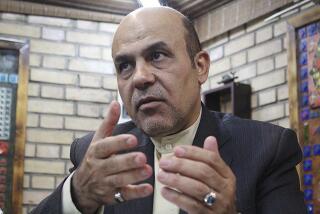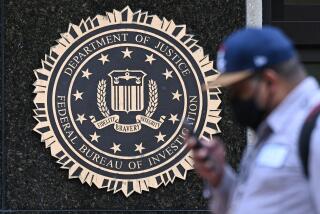THE IRAN--CONTRA HEARINGS : Also Tells of McFarlane’s Disgust With Ghorbanifar : Secord Scores Iran Middleman
- Share via
WASHINGTON — It was, Richard V. Secord recalled for investigating congressmen Wednesday, “a rather acid conversation.”
Manucher Ghorbanifar, the Iranian middleman in Washington’s arms deals with Tehran, had made a deposit in Secord’s Swiss bank account and the check had bounced. Secord, a retired Air Force major general who was ramrodding the deals for the White House, said this and other problems with Ghorbanifar left him “very angry.”
“On the telephone . . . I told him that I thought that he had behaved very poorly, that he was promising the moon always and never producing and that I was going to recommend that he be terminated,” Secord testified.
But Ghorbanifar “took it the wrong way.”
He thought “I was trying to have him killed,” Secord said to laughter in the historic Senate caucus room. “I think I even said later, ‘It’s not a bad idea but . . . it’s not what I had in mind.’ ”
Disdainful View
The episode, recounted in the second day of Secord’s testimony before congressional committees investigating the Iran- contra affair, gave a glimpse of the disdain with which Ghorbanifar was viewed by the U.S. principals, even as he played a central role in the sensitive operation that contributed to the greatest crisis of Ronald Reagan’s presidency.
The testimony also yielded rare--and sometimes humorous--insights into the shadowy world of arms sales and covert operations, of international intrigue and high-stakes meetings.
There was the time, Secord recalled, when Robert C. McFarlane, then Reagan’s national security adviser, flew secretly to London to meet with Ghorbanifar in a hotel in the fashionable Hyde Park district. The meeting table was small and “they were practically nose to nose throughout this entire session,” which continued for “a long time--far too long,” Secord said.
Ghorbanifar “ran through . . . the whole litany of things” he thought Americans wanted to hear--including the strategic importance of Iran, the Soviet threat to the region and possible Iranian help in freeing American hostages in Lebanon, Secord said.
Almost ‘Like a Tape’
“I’ve heard him make that address several times,” Secord said of Ghorbanifar. “He almost has it like a tape.”
The Iranian expatriate is a glib salesman, Secord said. “Ghorbanifar may have wanted to pose as an agent for Iran, but he was his own agent. He was a businessman. He was interested in making money and that was that.”
McFarlane left the London meeting “very, very unhappy,” Secord recalled, and on the return flight to Washington “said that this (Ghorbanifar) was one of the most despicable characters he had ever met.”
Secord prompted laughter when he said: “I found that kind of an interesting comment, because he was far from the most despicable character I have ever met.”
But for months after the December, 1985, meeting in London, U.S. officials continued to use Ghorbanifar as the middleman--even after he flunked a CIA lie detector test and bounced the check deposited in Secord’s Swiss account.
And there were other problems. Once, in February, 1986, Secord and others flew secretly to Europe for a scheduled meeting with Ghorbanifar, but the Iranian failed to appear. “It was a normal pattern for Ghorbanifar,” Secord said. “If he had a problem, he would be a no-show. He would go off the scope. When he got the problem solved, he would be back up in the loop.”
Hakim Translated
The Americans so distrusted Ghorbanifar that they used Albert A. Hakim, an Iranian-born businessman who was Secord’s business partner, as a translator at a February, 1986, meeting with Iranian officials in Frankfurt.
Ghorbanifar objected that Hakim “was an enemy of the state,” Secord said, although he did not personally know Hakim. “So we disguised him,” he said. “. . . We bought a wig for him, a gray wig, and put glasses on him. . . . It was just amazing. Even I couldn’t recognize him.”
The Americans introduced Hakim as “Ibraham Ibraham,” a contract translator of Turkish descent, “and it flew,” Secord said.
About this time, Secord said, the American and Israeli associates in the deal agreed to “commence an active search for new channels of communications with Iran. The Ghorbanifar channel was obviously flawed.”
More to Read
Sign up for Essential California
The most important California stories and recommendations in your inbox every morning.
You may occasionally receive promotional content from the Los Angeles Times.













